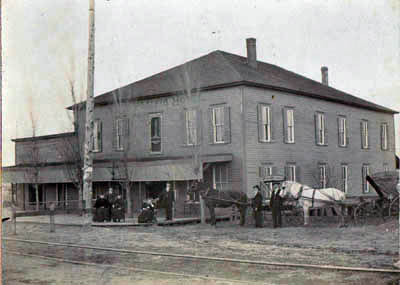A man entered the Pacific Hotel in Bells, Texas on Jan. 14, 1891 with a cocked revolver and ordered the parties present to hand over their wealth. After securing W.D. Elliott’s watch, Jim Isbell, the town marshal, also bartender, got out his pistol, when the robber fired, hitting Isbell on the right cheekbone, breaking the bone fearfully and knocking out the teeth on that side. The ball exited the back of the head. The marshal was murdered.
Mr. Keener, the lunch stand keeper at the same place, caught hold of the robber at this juncture, and in the scuffle secured his pistol, when the robber broke from him and ran, but was pursued by a black man. John Martin, who was in the saloon and whom the robber had forced to search the parties while he held his pistol on them. Martin pursued and overhauled him and held him until help arrived when he was secured and brought back.

The robber, George Smith, lived in Choctaw, Grayson County for approximately six years, as reported by the Galveston Daily News. Choctaw was located about seven miles east of Sherman with a population of 42 with three businesses.
An indictment came forward in late April 1892 which contained two counts, one charging murder upon malice aforethought, and the other a murder committed in the perpetration of robbery. The court, after submitting the issue of a killing upon express malice, further charged as follows:
“You are also informed that if you believe from the evidence that defendant with malice aforethought and in the perpetration of robbery shot and killed James Isbell with a pistol, then he would be guilty of murder of the first degree, although you should believe that Isbell fired the first shot.” This charge presented the law of the case.
The evidence in the case was insufficient to raise the issue of insanity but had it been otherwise, there was no error in instructing the jury that the defendant must “clearly” prove he was insane. A new trial was asked on account of the newly discovered evidence of one Kempton, who was confined in jail with the defendant several months before trial and who will swear that he had reason to believe from the acts of defendant that he was insane. The defendant certainly knew he was in jail with Kempton and he was chargeable with diligence. There was no error. Affirmed.
Capt. J.D. Woods, attorney for George Smith, in jail, awaiting the sentence which will fix the day of his execution, visited his client’s cell at the Houston street jail on May 1. Capt. Woods remarked as he saluted the condemned man who was sitting on the farthest side of the cell:
“Well, Smith, the court of appeals have affirmed your case.”
“Yes, I have been expecting that for some time,” and after a pause during which he rather pleasantly smiled he added: “When will the day be set?”
“It will be several days before the mandate gets here and then after the sentence is passed upon you it will be at least thirty days until the day set by the court comes around,” responded the attorney.
“Oh, well, but I don’t see why they should be so long about it, but let’s see,” he added laughingly, as he counted away on his fingers, “that will throw it into warm weather which will be nicer.”
Capt. Woods volunteered the statement that he would endeavor not to have the execution come off the same day with Massey, and Smith responded:
“That hole out there isn’t hardly large enough to drop more than one through.”
He stated that he didn’t care to see a preacher and that he had a Bible but would like to have some magazines to read. He said he had read so many novels he was sick of them.
George Smith, sitting in that jail on Houston Street in Sherman had all along maintained indifference when approached upon spiritual matters. Rev. J.A. Ivey, pastor of the Second Baptist Church, who had quite a consultation with the condemned man.
After fervent prayer, as the minister was preparing to leave, Smith asked him to come again, saying: “I believe you are really interested in me and did not come just out of curiosity, as so many have done.”
In late May 1892, Sheriff McAfee entered the district courtroom and just behind him came a clanking of shackles and the thin form of Smith, while in his read came Warden McKinney. The prisoner entered the dock, where Smith sat down and by his side, faithful to the very last, was his appointed counsel. The court said:
“Before proceeding in the case of the state of Texas against George Smith, I deem it well to speak of another case lately tried in this court. I refer to the case of the state of Texas against Sam Massey. Since his trial and within the last few days it has come to my knowledge that Sam desired to appeal his case. This is a privilege I would not refuse any prisoner, and I have ordered the sheriff to remove the prisoner beyond the jurisdiction of this county, and this he has already done.”
The courtroom was as still as the tomb but faces that had looked stern at Smith now looked with compassion perhaps it was a comparison of the two crimes. Smith had killed an able-bodied man, but Massey most brutally assaulted, endeavored to murder a family and tried to burn the house with the occupants, every one of whom he had left in an insensible condition.
The court motioned for George Smith to stand up. He did so and every eye was upon a pale face nearly covered with a growth of dark whiskers. The court said:
“George Smith, some time since a grand jury of Grayson County, TX, found a bill of indictment, charging you with the murder of James Isbell, in this county. You were given a trial before a petit jury and by them found guilty of murder in the first degree and the punishment assessed at death. A motion for a new trial was presented and after a hearing overruled. The case was appealed to the highest tribunal in Texas and by them affirmed. Is there any reason why the sentence of the court should not be passed upon you?”
The prisoner looked at the court squarely in the face and answered, “No, sir.”
“It is then my duty to remand you to the custody of the sheriff, to be by him held until Friday, the 8th of July, when within the hours prescribed by law you shall be hanged by the neck until dead.”
There was a clanking of chains, a rattling of shackles, and George Smith went back to jail to drag out the six weeks of life left to him.

About the same time in late May 1892, a petition for the commutation of the sentence of George Smith to life imprisonment had still been circulating, but a counter-petition protesting against any change from the verdict of the jury, signed by nearly everybody in Bells and vicinity, was presented to the governor as he passed through Bells. It is also stated that the governor was shown the room in which the killing took place. His excellency, of course, said neither yea nor nay…
George Smith, who was to hang July 8 was still cheerful at that time and remained that way as he entered upon his last night on earth with all the calm exterior that he has evinced since the very beginning. He had talked but little of himself. He selected a dark blue suit for the trap that was to be sprung at 2:30 pm the following day. It was thought for a while that he would select a soft flannel shirt, but a white shirt with a turndown collar was finally selected.
It had been over thirteen years since a man suffered the death penalty in Grayson County, the last being a man named Toettle, who killed Julius Brennan in Denison.
George Smith, the condemned man, was standing with his hands placed against the cell grating gazing out of the east window when the sun went down on his final day. Silently he stood and gazed until the tints and reflections in the clouds began to dim and the shadows of evening crept into the cell. With a deep-drawn sigh, he turned, placed two or three times across the iron floor and then sat down.
For just a few moments he bowed his head once in his hands and then arising he began chatting pleasantly with the deathwatch and his fellow cellmate, Henry Garbalt.
He was the same stout-hearted George Smith again. He talked a great deal about the preliminaries of the execution. He desired of Watchman Reidnoir to know why it was necessary to place a black cap over his head and if this was to prevent his seeing the execution. He was told that sometimes the face of those who were executed would become distorted and that it was not desired to have anything more than necessarily unpleasant attending an execution. He replied that this was certainly right.
He wanted to know why he would be executed in his stocking feet and rather laughingly remarked that he supposed they would have let him die with his boots on. He ate supper with apparent relish at the usual prison hour.
He had several little delicacies furnished him on his final day. It had been his custom to talk to the deathwatch until 10 or 11 pm in the evening and his last night was no exception. The general drift of his conversation did not differ from what it had been all along.
Occasionally he simply remarked: “This is my last night here.” This he said without the least signs of weakness.
At 11 pm he bade the watch good night and went to sleep. His rest was practically unbroken and the watchman in the after part of the night noticed nothing unusual in the actions of the prisoner. He arose at 7 am, or perhaps a little earlier on his final morning. He saluted his fellow prisoners very pleasantly and passed a cheerful “Good morning” to the watchman outside. He ate the regular breakfast and was favored again with quite a number of little delicacies.
At 8:30 am he was shaved and very soon after received his attorney, Captain J.D. Woods, who inquired if there was any word or message, he desired to send to anyone. To this, he made his stereotyped reply: “There is nothing that I wish to say; it would do no one any good.”
A cigar was offered him that morning, but Smith remarked that it was a habit he had never indulged in, accepted the preferred weed, but handed it to Garbalt, his cellmate. Several times he has asked if he would be allowed to see his coffin. When Dr. E.H. Winn, the prison physician was called, Smith’s face lit up in expectancy. He began a careful and detailed inquiry of the sensation experienced by a man when undergoing execution by hanging. He desired to know the length of time required for death to ensue or if unconsciousness came before death.
He seemed gratified at the explanation of the physician that death was practically painless and said he had heard so. With the assistance of Garbalt at 9 am, he began to dress in his desired dark blue suit.
By 10 am he was fully attired, and George Smith was decidedly a handsome man.
Shortly after noon, Smith finished eating a hearty meal, in which there were a number of delicacies and any little thing he expressed a desire for.
At 2:08 pm Drs. Winn and King were admitted and injected one-fourth of a grain of morphine into his arm. At 2:18 the sheriff, accompanied by the newspaper men present, went to the cell, and there the death warrant was read.
When the Sheriff had finished and turned away, Smith took one or two strides across his cell and taking his handkerchief, wipe the perspiration from his brow. It was 2:23 when the iron door of the cell was swung open and Smith with a firm step came out and walked with the sheriff to the iron trap. Of all in the crowd, there is little doubt that he was as cool and collected as any man there. He stepped upon the door, and at the request of Sheriff McAfee, turned his face to the east. He said nothing but looked around and scanned the crowd. He was still cool, and as the deputies were pinioning his legs, he looked at them intently. When they began to tie his arms, he remarked:
“Wouldn’t you just as soon tie them in front of me?”
When told that they would have to be tied behind him, he said, “All right,” and requested that they be more securely pinioned, which was granted. His limbs having been tied the prisoner straightened up and as the black cap was being placed on his head, he looked at Rev. Gibbs, who stood near him, and said: “Goodbye, Mr. Gibbs.” Then the black mask came down and George Smith had looked for the last time on earth.
When the cap was being adjusted, he said: “A fellow can’t breathe much in this,” and his last words were, “That is pretty tight,” as the knot was drawn down by the sheriff.
At 2:23 the trap was sprung, and the body shot with rapidity through the open door. The rope tightened up and gave the body a swing, but not a muscle quivered in the suspended body. There was none of the terrible twisting and writhing which usually sicken spectators.
For thirteen minutes there were evidences of a beating pulse. In fifteen minutes, he was pronounced dead by his prison physician and his assistants. His body was immediately cut down and placed on an iron cot brought in from the hospital. His neck was found by the physicians to have been broken and Dr. Winn said to the reporter: “He suffered no pain in dying.”
In a few minutes, the body was placed in a nice coffin, provided by a public subscription, and was turned over to some of his old friends and neighbors in Choctaw, where he was taken for burial. There was not a single event of any annoying nature in the whole execution, which was very successful.
Hanging has been practiced legally in the United States of America from the nation’s birth, up to 1972 when the United States Supreme Court found capital punishment to be in violation of the Eighth Amendment to the United States Constitution. Four years later, the Supreme Court overturned its previous ruling, and in 1976, capital punishment was again legalized in the United States. Hanging has returned to the states of Washington, Delaware, and New Hampshire.
*Research attributes to YesterYearNews and the Galveston Daily News.

